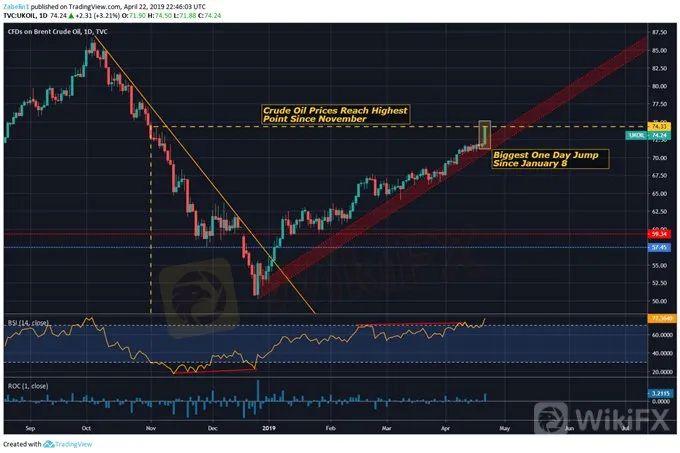简体中文
繁體中文
English
Pусский
日本語
ภาษาไทย
Tiếng Việt
Bahasa Indonesia
Español
हिन्दी
Filippiiniläinen
Français
Deutsch
Português
Türkçe
한국어
العربية
Euro at Risk as US Ends Iran Oil Waivers - Trade War Tensions Rise
Abstract:The Euro could suffer after the US recent decision to end all Iranian oil-importing waivers. The conflicting geostrategic approaches to Iran between the EU and US may strain already-tense trade relations.
TALKING POINTS – IRAN OIL WAIVERS, EU US TRADE WAR, EURO
US announced the discontinuation of Iran oil waivers
Euro at risk from divergence in EU-US foreign policy
How will this impact Fridays US-Japan trade talks?
See our free guide to learn how to use economic news in your trading strategy!
While the surge in crude oil prices after the US ended sanction wavers in Iranian oil took center stage, another asset may soon be in the spotlight: the Euro. The divergence in US and EU foreign policy toward Iran may add another crack to an already-fractured relationship. This comes as policymakers from both sides of the Atlantic prepare to re-enter what appears to be another trade war.
In 2018, President Donald Trump shredded the 2015 nuclear deal with Iran and reimposed sanctions against Tehran. The EU, however, wanted to preserve the previous agreement as a way to maintain regional stability. European policymakers subsequently created an economic program that allowed the EU to circumvent US sanctions and facilitate trade with Iran as a way to incentivize Tehran to continue with the original agreement.
If the EU pursues its original plan as a way to mitigate Irans economic crisis, it could lead to the US imposing sanctions against the EU. The result would almost certainly involve retaliation and could lead to a trans-Atlantic trade war. This would be occurring right as the US approaches what appears to be the end of an economic conflict with China, one of the biggest weights dragging global growth according to the IMF and the WTO.
The discontinuation of Iranian oil-importing waivers adds an additional complication to US-Japan relations too. Prime Minister Shinzo Abe will be holding a summit with Trump on Friday as the White Houses continues its campaign to redesign 21st century global trade relations. Japan may find itself scrambling to find new sources of foreign oil and this could lead to less-than-optimal backdrop for negotiations.
A deterioration in US-EU/Japan trade relations would likely not only affect the Euro but weigh on sentiment-linked currencies like the New Zealand and Australian Dollars. Growth in Europe and the US has been increasingly underperforming relative to economists‘ expectations and global PMI’s have been showing worrisome weakness. Monitoring political risk therefore becomes exponentially more crucial because of the inherently embedded market reactions it elicits.
Chart Showing Crude Oil Prices – Daily Chart
FX TRADING RESOURCES
Join a free Q&A webinar and have your trading questions answered
Just getting started? See our beginners guide for FX traders
Having trouble with your strategy? Heres the #1 mistake that traders make
--- Written by Dimitri Zabelin, Jr Currency Analyst for DailyFX.com
To contact Dimitri, use the comments section below or @ZabelinDimitrion Twitter
Disclaimer:
The views in this article only represent the author's personal views, and do not constitute investment advice on this platform. This platform does not guarantee the accuracy, completeness and timeliness of the information in the article, and will not be liable for any loss caused by the use of or reliance on the information in the article.
Read more

KVB Market Analysis | 23 August: JPY Gains Ground Against USD as BoJ Signals Possible Rate Hike
JPY strengthened against the USD, pushing USD/JPY near 145.00, driven by strong inflation data and BoJ rate hike expectations. Japan's strong Q2 GDP growth added support. However, USD gains may be limited by expectations of a Fed rate cut in September.

KVB Market Analysis | 22 August: Gold Stays Strong Above $2,500 as Fed Rate Cut Hints Loom
Gold prices remain above $2,500, near record highs, as investors await the Federal Open Market Committee minutes for confirmation of a potential Fed rate cut in September. The Fed's dovish shift, prioritizing employment over inflation, has weakened the US Dollar, boosting gold. A recent revision showing the US created 818,000 fewer jobs than initially reported also strengthens the case for a rate cut.

KVB Market Analysis | 21 August: USD/JPY Stalls Near 145.50 Amid Diverging Economic Indicators
USD/JPY holds near 145.50, recovering from 144.95 lows. The Yen strengthens on strong GDP, boosting rate hike expectations for the Bank of Japan. However, gains may be limited by potential US Fed rate cuts in September.

KVB Market Analysis | 20 August: Gold Prices Remain Near Record High Amid US Rate Cut Expectations
Gold prices remain near record highs, driven by expectations of a US interest rate cut and a weakening US Dollar. Investors are focusing on the upcoming Jackson Hole Symposium, where Fed Chair Jerome Powell's speech will be closely watched for clues on the Fed's stance. Additionally, the release of US manufacturing data (PMIs) is expected to influence gold's direction.
WikiFX Broker
Latest News
Tokyo Police Arrest 4 for Unregistered FX Trading Scheme
BSP Shuts Down Uno Forex Over Serious AML Violations
ACY Securities Expands Global Footprint with South Africa Acquisition
Rupee gains against Euro
WikiEXPO Global Expert Interview: The Future of Financial Regulation and Compliance
DFSA Warns of Fake Loan Approval Scam Using Its Logo
Consob Sounds Alarm: WhatsApp & Telegram Users Vulnerable to Investment Scams
CySEC Revokes UFX Broker Licence as Reliantco Halts Global Operations
Axi Bids AUD 52M to Acquire Low-Cost Broker SelfWealth, Outbidding Competitor Bell Financial
Crypto Influencer's Body Found Months After Kidnapping
Currency Calculator


